
"Ain't Nothing Like the Real Thing" is a 1968 single released by American R&B/soul duo Marvin Gaye and Tammi Terrell, on the Tamla label in 1968. The B-side of the single is "Little Ole Boy, Little Ole Girl" from the duo's United LP. The first release off the duo's second album: You're All I Need, the song - written and produced by regular Gaye/Terrell collaborators Ashford & Simpson - became a hit within weeks of release eventually peaking at number 8 on the Billboard Hot 100 and number 1 on the Hot Soul Singles chart, the first of the duo's two number 1 R&B hits. In the UK "Ain't Nothing Like the Real Thing" reached number 34.
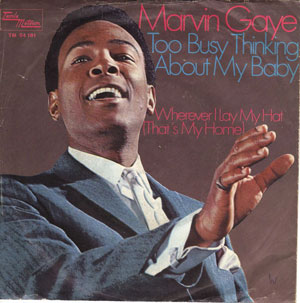
"Too Busy Thinking About My Baby" is a Motown song written by Norman Whitfield, Barrett Strong, and Janie Bradford. The song was first recorded by The Temptations as a track on their 1966 album Gettin' Ready. Eddie Kendricks sings lead on the recording, which was produced by Whitfield. Jimmy Ruffin also recorded a version with The Temptations providing background vocals in 1966. It remained unreleased until 1997.

"Still the One" is a song written by Johanna Hall and John Hall, and recorded by the soft rock group Orleans on their album Waking and Dreaming, released in 1976, which reached No. 5 on the Billboard Hot 100.

"Ooo Baby Baby" is a song written by Smokey Robinson and Pete Moore. It is a classic 1965 hit single by The Miracles for the Tamla (Motown) label. The song has inspired numerous other cover versions by other artists over the years, including covers by Ella Fitzgerald, Todd Rundgren, The Escorts, The Five Stairsteps, Linda Ronstadt, and many others. The Miracles' original version of "Ooo Baby Baby" is listed as number 266 on Rolling Stone Magazine's list of "The 500 Greatest Songs of All Time".

"Laughter in the Rain" is a song composed and recorded by Neil Sedaka, with lyrics by Phil Cody. It includes a 20-second saxophone solo by Jim Horn.

"You're My World" is a cover of Italian ballad originally recorded in 1963 as "Il mio mondo" by Umberto Bindi, who co-wrote the original version with Gino Paoli. Subsequently, an English version was commissioned, and the lyrics were written by Carl Sigman as "You're My World". The song reached No. 1 in Australia (twice), Belgium, Mexico, Netherlands, South Africa and United Kingdom in recordings by Cilla Black, Daryl Braithwaite, Guys 'n' Dolls and Helen Reddy. Black's and Reddy's versions reached the US Top 40 in 1964 and 1977, respectively. The song also reached No. 1 in France and Spain in the respective translations "Ce monde" and "Mi Mundo", both sung by Richard Anthony.
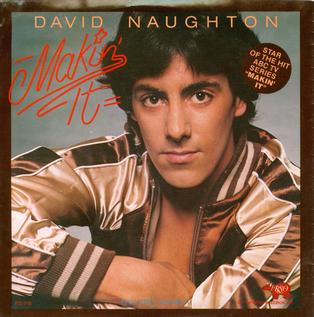
"Makin' It" is a 1979 disco song performed by David Naughton, his only musical release. It was the theme song for the television series Makin' It, in which Naughton starred. It was written by the successful songwriting team Freddie Perren and Dino Fekaris. It was released as both a 7-inch single and a 12-inch single, with an instrumental version of the song titled "Still Makin' It" as the B-side.

"Baby, What a Big Surprise" is a ballad written by Chicago's then bassist/singer Peter Cetera, which appeared on their album Chicago XI (1977), with Cetera singing lead vocals. The first single released from the album reached number 4 on the US Billboard Hot 100 chart.

"More Love" is a 1967 hit single recorded by the American soul group The Miracles for Motown Records' Tamla label. The single, included on the group's 1967 album Make It Happen, later reissued in 1970 as The Tears of a Clown. Kim Carnes's 1980 cover of the song reached the Top 10 of Billboard's Adult Contemporary and Hot 100 charts.

"Show and Tell" is a popular song written by Jerry Fuller and first recorded by Johnny Mathis in 1972. This original version made it to #36 on the Easy Listening chart.

"Keep on Singing" is a 1973 song composed by Danny Janssen and Bobby Hart, and was originally recorded by Austin Roberts from the album Austin Roberts. It was released as a single on Chelsea Records and reached No. 50 on the U.S. Billboard Hot 100 and No. 39 on the Cash Box Top 100. In Canada it reached # 79. "Keep on Singing" was best known as a hit single by Helen Reddy in 1974.

"Lonely Night (Angel Face)" is a song written by Neil Sedaka. The song was first recorded by Sedaka and appeared as a track on his 1975 studio album, The Hungry Years. The following year the song was made popular when covered by the pop music duo Captain & Tennille, who took their version to number 3 on the Billboard Hot 100.
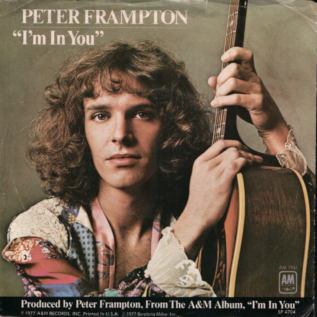
"I'm in You" is the hit song released by Peter Frampton as a single from his album I'm in You, released in 1977. It rose to No. 2 on the US Billboard Hot 100 and No. 1 on the Cash Box Top 100 and in Canada, becoming his most successful single. The song was kept from reaching the top spot on Billboard by Andy Gibb's "I Just Want to Be Your Everything".

"She's a Lady" is a song written by Paul Anka and released on his album Paul Anka '70s. The most successful recording was performed by Tom Jones and released at the beginning of 1971. It is Jones's highest-charting single in the U.S..

"Never My Love" is a pop standard written by American siblings Don and Dick Addrisi, and best known from a hit 1967 recording by the Association. The Addrisi Brothers had two Top 40 hits as recording artists, but their biggest success as songwriters was "Never My Love". Recorded by dozens of notable artists in the decades since, in 1999 the music publishing rights organization Broadcast Music, Inc. (BMI) announced it was the second most-played song on radio and television of the 20th century in the U.S.
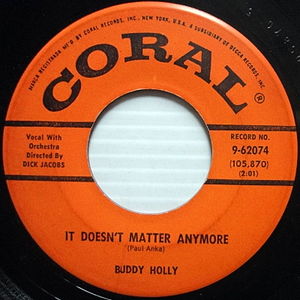
"It Doesn't Matter Anymore" is a pop ballad written by Paul Anka and recorded by Buddy Holly in 1958. The song was issued in January 1959, less than a month before Holly's death. "It Doesn't Matter Anymore" reached number 13 as a posthumous hit on the Billboard Hot 100 chart in early 1959, shortly after Holly was killed in a plane crash on February 3, 1959. The single was a two-sided hit, backed with "Raining in My Heart". "It Doesn't Matter Anymore" was Holly's last US Top 20 hit and featured the orchestral backing of Dick Jacobs. It was also successful in the United Kingdom, where it became the country's first posthumous number 1 hit.
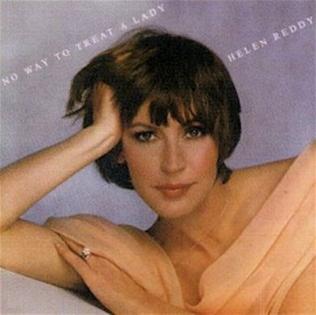
"Ain't No Way to Treat a Lady" is a 1974 written and first recorded by American singer-songwriter Harriet Schock. It was covered by various other artists, and saw its greatest success when it was covered by Helen Reddy, whose 1975 rendition became a top 10 hit.

"Do I Love You" is a song co-written and recorded by Paul Anka, from his 1972 eponymous LP. Released as an advance single in late 1971, "Do I Love You" reached number 14 on the Easy Listening Singles charts of both the U.S. and Canada, number 16 on the Canadian Pop chart, and was a modest hit on the U.S. Hot 100 as well. As with the earlier "My Way", it was adapted from a French-language song popularized by Claude François, and Anka composed the English lyrics.

"This Is Your Song" is a song written by Paul Anka, originally recorded as the B-side of his non-album single, "While We're Still Young", and produced by Arif Mardin in 1972, during Anka's short period on Buddah Records. That single fell just short of the top ten on the Canadian pop chart. But Anka offered the song to his protege, pop singer/songwriter Don Goodwin in 1973. Goodwin grew up in Aspen, Colorado, and was discovered by Paul Anka in Las Vegas.

"I Don't Like to Sleep Alone" is a song written by Paul Anka and performed by Anka featuring Odia Coates. It was featured on his 1975 album Feelings. The song was arranged by Jimmie Haskell and produced by Rick Hall.




















